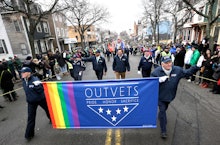Boston Just Made History With Its St. Patrick's Day Parade

Equality for the LGBT community has been making waves at courthouses across the country, but on Sunday, it reached a different destination: the streets of Boston, during one of the largest St. Patrick's Day parades in the country.
For the first time in its 114-year history, the parade featured LGBT activist groups alongside dozens of other institutions. Reuters reports that two organizations, Boston Pride and OutVets, marched under flowing rainbow flags as they wound their way through South Boston.
"This is personally one of the greatest days of my life," Bryan Bishop, the founder of OutVets, which honors gay military veterans, told Reuters.
The parade's organizers, the South Boston Allied War Veterans Council, have long barred openly gay groups from participating. The Supreme Court upheld that position in 1995, when it ruled that the council's exclusionary behavior was protected by the First Amendment.
But Brian Mahoney, the current commander of the council, recently helped reverse that tradition, clearing the path for openly gay activists to march in the storied parade. "Who am I to judge?" he said, according to the Associated Press.
"It's kind of moving on to a new chapter of Boston's history," Boston Mayor Marty Walsh told reporters. Walsh was the first Beantown mayor in 20 years to participate in the festivities, as previous mayors had boycotted the parade following the Supreme Court's decision.
Not everybody was pleased with Boston Pride and OutVet's inclusion — the Catholic organization Knights of Columbus dropped out of the parade on Friday, describing it as "politicized and divisive" — but many of those involved saw it as a hugely positive step.
"This is a tremendous leap forward," said Sylvain Bruni, a Boston Pride organizer, according to the AP.
A thorny history. St. Patrick's Day parades have long courted controversy when it comes to the participation of the gay community.
New York City, which holds the largest St. Patrick's Day parade in the world, still can't make up its mind when it comes to including LGBT groups. The community has traditionally faced stiff opposition from organizers, who have stated that although openly gay people are allowed to march, they must do so with other groups and can't hold banners establishing their sexuality.
This year's parade has unfolded differently: One LGBT group, OUT@NBCUniversal, was given permission to march. The organization said in a statement that they "enthusiastically embrace the gesture of inclusion," but other groups are less convinced.
"While this development is long overdue, inviting one group to march at the exclusion of all others ... is a far stretch from the full inclusion we deserve," Nathan Schaefer, executive director of Empire State Pride Agenda, told the Associated Press.
New York City Mayor Bill de Blasio declined to participate in the event, declaring that "there has to be more progress" before he would consider marching.
Elsewhere in the country, the debate over LGBT participation is less knotty: In 2014, one group in Cleveland became the parade's first-ever openly gay marchers — a fact they didn't even realize. In Chicago, gay groups have been active in the city's celebration since the mid-1990s, according to Time.
"Our city realized a long time ago that we have so much more in common than apart," Tom Tunney, Chicago's first openly gay alderman, told the magazine. "We're a city of cultures, and the LGBT community is a part of it."
Boston's decision to allow LGBT groups should be applauded. While one could rightfully argue that gay groups should never have been banned from the parade in the first place, the fact remains that equality in the United States is never a given.
Boston's reversal, as late as it may be, is a step forward. It represent yet another falling domino in the fight for equal rights, and though it may not be the most policy-driven battleground, it's a battleground nonetheless.
New York City is one of the last remaining holdouts of inclusionary St. Patrick's Day festivities, which accomplishes exactly one thing: It makes the city look both remarkably backward and blindingly stubborn. Boston and New York may be bitter rivals, but in this case, Boston has come out on top.